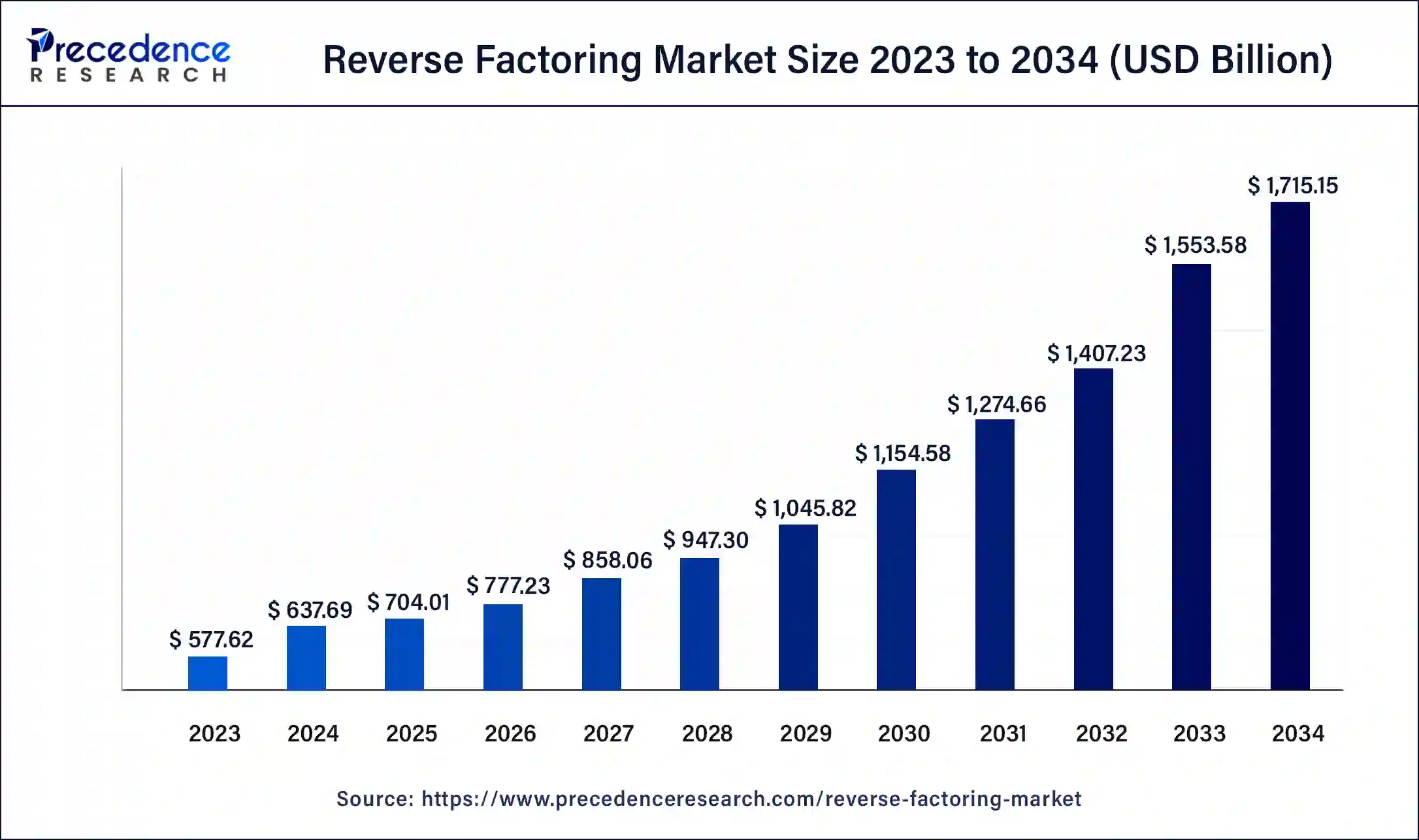- Europe has contributed more than 50% of market share in 2023.
- By category, the domestic segment held the largest market share in 2023.
- By category, the international segment is anticipated to grow at a remarkable CAGR between 2024 and 2033.
- By financial institution, the bank segment has generated the biggest market share in 2023.
- By financial institution, the non-banking financial institutions segment is expected to expand at the fastest CAGR over the projected period.
- By end-use, the manufacturing segment has led the significant market share in 2023.
- By end-use, the healthcare segment is expected to expand at the fastest CAGR over the projected period.

Get a Sample: https://www.precedenceresearch.com/sample/3985
Reverse Factoring Market Scope
| Report Coverage | Details |
| Growth Rate from 2024 to 2033 | CAGR of 10.21% |
| Global Market Size in 2023 | USD 577.62 Billion |
| Global Market Size by 2033 | USD 1,527.05 Billion |
| Largest Market | Europe |
| Base Year | 2023 |
| Forecast Period | 2024 to 2033 |
| Segments Covered | By Category, By Financial Institution, and By End-use |
| Regions Covered | North America, Europe, Asia-Pacific, Latin America, and Middle East & Africa |
Reverse Factoring Market Dynamics
One of the key drivers of the reverse factoring market is the need for businesses to manage their working capital efficiently. By offering early payment options to suppliers, buyers can negotiate favorable terms with their suppliers, such as discounts for early payment, while also extending their own payment terms. This benefits both parties by improving liquidity and optimizing cash flow within the supply chain.
Furthermore, the reverse factoring market has experienced significant growth due to globalization and the increasing complexity of supply chains. As businesses expand their operations globally, they often engage with a diverse network of suppliers across different regions and countries. Reverse factoring provides a standardized and efficient mechanism for managing payments across these complex supply chains, reducing administrative burdens and enhancing transparency.
Moreover, regulatory changes and initiatives aimed at promoting financial inclusion and supporting small and medium-sized enterprises (SMEs) have also contributed to the growth of the reverse factoring market. Governments and regulatory bodies in various countries have recognized the importance of supply chain finance in improving access to financing for SMEs, which are often more vulnerable to cash flow constraints and liquidity challenges.
In addition to its growth drivers, the reverse factoring market also faces several challenges and considerations. One such challenge is the risk associated with supplier financing, including credit risk, operational risk, and legal and regulatory risk. Financial institutions providing reverse factoring services need to assess the creditworthiness of both the buyer and the supplier to mitigate the risk of default and ensure the sustainability of the arrangement.
Furthermore, concerns have been raised about the potential impact of reverse factoring on supplier relationships and working capital management. While it can provide short-term benefits in terms of improved liquidity, there is a risk that extended payment terms and reliance on reverse factoring could strain supplier relationships and weaken the financial health of suppliers in the long run.
Read Also: Aviation IoT Market Size to Cross USD 69.51 Billion by 2033
Recent Developments
- In October 2022, HSBC Hong Kong, a wholly-owned subsidiary of the HSBC Group, unveiled Trade Platform, a comprehensive e-platform designed to offer flexibility, safety, and security in managing global trade transactions. It caters to trade loans for sellers and buyers, guarantees, import bills, and import documents for credit.
- In December 2022, Endesa, in collaboration with Banco Bilbao Vizcaya Argentaria, Caixabank, and Santander, introduced a circular reverse factoring solution. This innovative initiative includes incentives and rewards for sustainable practices, thereby enhancing their competitiveness within the economy.
Reverse Factoring Market Companies
- Citibank
- HSBC
- Santander
- Banco Bilbao Vizcaya Argentaria (BBVA)
- Caixabank
- JPMorgan Chase
- Bank of America
- BNP Paribas
- Deutsche Bank
- Barclays
- Société Générale
- Credit Suisse
- ING Group
- Wells Fargo
- Standard Chartered
Segments Covered in the Report
By Category
- Domestic
- International
By Financial Institution
- Banks
- Non-banking Financial Institutions
By End-use
- Manufacturing
- Transport & Logistics
- Information Technology
- Healthcare
- Construction
- Others (Retail, Food & Beverages, Among Others)
By Geography
- North America
- Europe
- Asia-Pacific
- Latin America
- Middle East and Africa
Contact Us:
Mr. Alex
Sales Manager
Call: +1 9197 992 333
Email: sales@precedenceresearch.com
Web: https://www.precedenceresearch.com
Blog: https://www.expresswebwire.com/
Blog: https://www.uswebwire.com/
